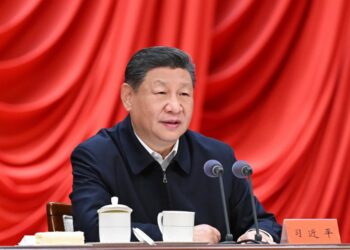
Chinese and local Sinopec employees carry out geophysical prospecting work in Yemen.
In Chapter XX of Volume IV of Xi Jinping: The Governance of China, the quality development of the Belt and Road Initiative (BRI) is discussed. This section emphasizes the need to improve the quality and sustainability of projects carried out under the initiative, while strengthening international cooperation and ensuring mutual benefits for participating countries. This announcement marks a new essential step to revitalize this project launched in 2013, which has demonstrated its major role for better connectivity on a global scale.
Xi Jinping illustrates that although the BRI has already made significant progress in infrastructure construction and commercial expansion, it is time to move to a more sustainable and quality development model. This means favoring projects that are economically viable, environmentally friendly and socially responsible. This new vision can be compared to the second stage of launching a rocket: after efficiency, comes sustainability, marked by quality. This criterion is essential to the sustainability of the project, which today affects many sectors such as infrastructure, trade, governance and development.
International solidarity and cooperation
The first aspect addressed is the notion of international cooperation. The fight against COVID-19 has been a painful reminder that solitary and selfish initiatives are doomed to failure. In international relations and health, solidarity is essential to address global challenges, such as pandemics and health crises. Cooperation between nations allows resources, knowledge and skills to be pooled to ensure equitable access to healthcare, medicines and vaccines, as the 2020 crisis has shown.
Multilateralism plays a key role in providing a platform where countries can work together within international organizations such as the WHO, to define common strategies, strengthen health systems and promote a coordinated response to global health emergencies. This health example illustrates the Chinese president’s idea of promoting cooperation based on technological innovations, modern approaches to financing and better coordination of policies between partner countries. The objective is to ensure that BRI projects are not limited to large infrastructure, but provide long-term benefits for economic and social development. This involves strengthening other non-traditional sectors of the new Silk Roads project, initially focused on major infrastructure.
For an inclusive ICR
The Chinese president evokes “consultation, synergy and sharing” to make the initiative more inclusive and beneficial to the countries involved. Quality development is based on the integration of different economies while avoiding imbalances. The aim is to create balanced partnerships, where each party derives economic and social benefits from cooperation. In the field of health, the joint production of vaccines in Brazil, the United Arab Emirates, Malaysia and Pakistan illustrates this desire for cooperation through the new Silk Roads and an illustration of the legacy of the common fight against virus.
According to the Chinese president, the notion of inclusiveness of all partners must follow an ideal: achieving common objectives in the fight against poverty and improvement of human dignity. These objectives translate into better economic and commercial connectivity, the fight against poverty, the integration of economies into the global market, and the participation of all stakeholders in sub-regional, regional and global governance. However, to work for the quality development of the ICR, there is a commitment to the financial sustainability of the project. Consequently, the problem of managing the debt of partner countries arises. Xi Jinping emphasizes the need to avoid excessive reliance on debt to finance projects. It encourages more transparent and sustainable financial practices to guarantee long-term economic stability. To ensure the long-term viability of projects, innovative financial mechanisms are put in place, including public-private partnerships and financing on favorable terms, in order to avoid excessive debt levels and guarantee a shared benefit between the actors involved. The Chinese president mentions new subjects such as risk control and improving the profitability of investments. Finally, we can cite the process of cancellation, relief or restructuring of the debt of certain partner countries. Symbol of intelligent management of cooperation, according to the situation of each actor, without predation and of the adaptation of the debt repayment process according to its economic and political situation.
The development of the BRI and China’s growing place in global diplomacy demonstrate the country’s new role in global governance. As the driving force behind the initiative, China intends to play a leading role in establishing new standards for international cooperation, fostering a more inclusive, equitable and cooperative model of global governance. Faced with the major challenges of the 21st century, it is crucial to adopt a greener approach in the implementation of ICR projects. China calls for investments in environmentally friendly projects, ecological management of resources, and the promotion of a low-carbon economy. This message is relayed during each international meeting as well as in bilateral meetings between China and the BRI partner countries.
*ADRIEN MUGNIER is director of the French Observatory of the New Silk Roads, a study and monitoring center on the “Belt and Road” initiative.







